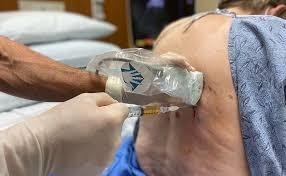The nurse is assessing an older client who is having difficulty remembering events from earlier in the day and concentrating on the questions being asked. A family member shares that the client's home was recently sold and the client has just moved in with them.
Which nursing response best promotes effective communication with the family?
If the dementia is a result of Alzheimer's disease, it is often reversible even in the late stages.
The client is exhibiting symptoms of dementia and because of age, it may be permanent.
The client's delirium may be due to depression and is possibly reversible.
Delirium is often a sign of underlying mental illness and institutionalization is often necessary.
The Correct Answer is C
Given the client's difficulty with memory, concentration, and recent life changes, it is
important for the nurse to acknowledge the possibility of delirium as a potential cause of the client's symptoms. Delirium is an acute state of confusion that can be caused by various factors, including physical illness, medication side effects, and emotional stressors. It is often reversible when the underlying cause is identified and treated.
By mentioning the possibility of delirium and its potential reversibility, the nurse opens up the conversation to exploring other factors that may be contributing to the client's symptoms. This response also provides hope to the family by suggesting that the client's condition may improve with appropriate interventions and management.
Stating that dementia resulting from Alzheimer's disease is often reversible even in the late stages is incorrect. Alzheimer's disease is a progressive neurodegenerative disorder that currently has no cure, and the symptoms tend to worsen over time.
Reversibility is not typically associated with Alzheimer's disease.
Indicating that the client's symptoms of dementia are permanent due to age is a generalization and may not be accurate. While age is a risk factor for certain types of dementia, such as Alzheimer's disease, it does not mean that all memory and cognitive difficulties in older adults are irreversible.
Suggesting that delirium is often a sign of underlying mental illness and institutionalization is necessary is not appropriate. Delirium is a medical condition that requires thorough assessment and appropriate management, including addressing any underlying causes. Institutionalization may be considered in certain situations, but it is not the primary focus of communication in this context.
Nursing Test Bank
Naxlex Comprehensive Predictor Exams
Related Questions
Correct Answer is ["B","C","D","E"]
Explanation
Choice A rationale: Misplacing car keys occasionally is a common occurrence and may not necessarily indicate Alzheimer's disease. It can happen to anyone, especially when distracted or in a hurry.
Choice B rationale: Difficulty performing familiar tasks, such as cooking a meal or driving to a familiar location, is an early warning sign of Alzheimer's disease. It indicates changes in cognitive function.
Choice C rationale: Losing sense of time, such as not knowing the date, day of the week, or season, can be an early indicator of Alzheimer's disease. It reflects impairments in temporal orientation.
Choice D rationale: Problems with performing basic calculations, such as managing finances or following a recipe, are early signs of Alzheimer's disease. It shows a decline in cognitive abilities related to numbers and problem-solving.
Choice E rationale: Becoming lost in a usually familiar environment, such as getting disoriented in one's own neighborhood, is a significant early warning sign of Alzheimer's disease. It suggests spatial and memory impairments.
Correct Answer is D
Explanation
A) Incorrect- Dullness bilaterally on percussion is not a normal finding, but it is not an immediate concern after thoracentesis. It may indicate fluid accumulation or consolidation in both lungs, which could be related to other conditions such as pneumonia or heart failure.
B) Incorrect- Serosanguinous drainage from the chest tube is expected after thoracentesis, as long as it is not excessive or continuous. The nurse should monitor the amount and color of the drainage and document it accordingly.
C) Incorrect- Diminished breath sounds in the left lower lobe are also expected after thoracentesis, as the procedure removes fluid and air from the pleural space and reduces lung expansion. The nurse should auscultate the lungs before and after the procedure and compare the findings. The breath sounds should improve gradually as the lung re-expands.
D) Correct- This is a sign of tension pneumothorax, which is a life-threatening complication of thoracentesis. Tension pneumothorax occurs when air accumulates in the pleural space and creates positive pressure that pushes the mediastinum (the heart, great vessels, and trachea) to the opposite side of the chest. This can impair venous return, cardiac output, and respiratory function. The nurse should report this finding to the healthcare provider immediately and prepare to assist with needle decompression or chest tube insertion.

Whether you are a student looking to ace your exams or a practicing nurse seeking to enhance your expertise , our nursing education contents will empower you with the confidence and competence to make a difference in the lives of patients and become a respected leader in the healthcare field.
Visit Naxlex, invest in your future and unlock endless possibilities with our unparalleled nursing education contents today
Report Wrong Answer on the Current Question
Do you disagree with the answer? If yes, what is your expected answer? Explain.
Kindly be descriptive with the issue you are facing.
